We all know that recalls can be extremely costly activities but they are a critical element of the product supply business, and the final line of defense to keep consumers safe. That’s why a reputable food liability insurance program is a must. Manufacturers are under extreme pressures unlike anything we have seen in recent times; factors include war, adverse weather, import/export controls, competition, energy and labor market shortages. All these push prices and costs to an all-time high. As budgets are cut, and some companies struggle, there is the risk, even unintentionally, of a knock on effect on quality, safety and ultimately recall. Preventing product recalls and being prepared to manage them is part of the role of all those involved in product manufacturing and supply. We know that manufacturers take these responsibilities very seriously but sometimes accidents happen or mistakes are made.
UK based RQA Group are the leading experts in product recall, product risk and the wider world of crisis management has now published their Product Recall Bulletin covering the full recall data from 2022, covering food, consumer products and automotive authorities around the world. We are sharing their data relative to product recall as it applies to the food sector.
RQA Group works globally with product manufacturers to help them prevent and prepare for product recalls. As preferred consultants to many of the world’s leading product recall insurers, RQA Group works with insured companies who have a reliable food liability insurance program to provide a wide range of product safety and risk management services as well as urgent support during a potential recall incident.
Food Recalls as reported by the US FDA Key points:
• Total number of FDA recall events in 2022 are the second lowest in the past 6 years. Only in 2020, at the height of the pandemic, were recall numbers lower.
• The number of different products recalled in 2022 ended the year higher than the two previous years but still quite a way down on pre-pandemic numbers.
• The number of recalls due to avoidable labeling issues “Never events” is increasing; accounting for over a quarter of all recall events in 2022, compared with 20% in 2021.
• Pathogens remain the most common contaminant responsible for FDA reported recalls, with Listeria monocytogenes causing the most recalls and Salmonella sp. second.
• Following large-scale recalls of fresh produce, the US FDA have begun to implement more stringent controls at farm level on agricultural practices such as irrigation and crop testing controls – this may help to reduce recall numbers in this category in 2023 and beyond.
The graph shows that the number of different food products recalled in 2022, was 40% higher than in 2021 but still relatively low compared with previous years.
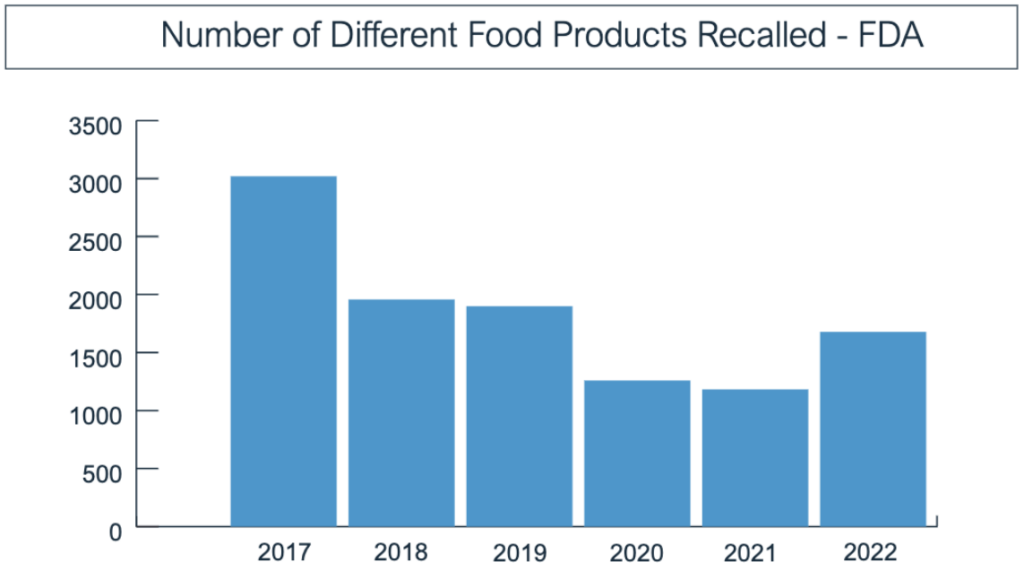
The trend is growing for individual recall events to involve more different products, suggesting that recalls have the potential to be larger and more complex. This is why a food liability insurance program is a necessary part of the food production process. If we look at the number of different products recalled per event, it is clear that the recalls in 2022 on average involved more products than they have since 2017.
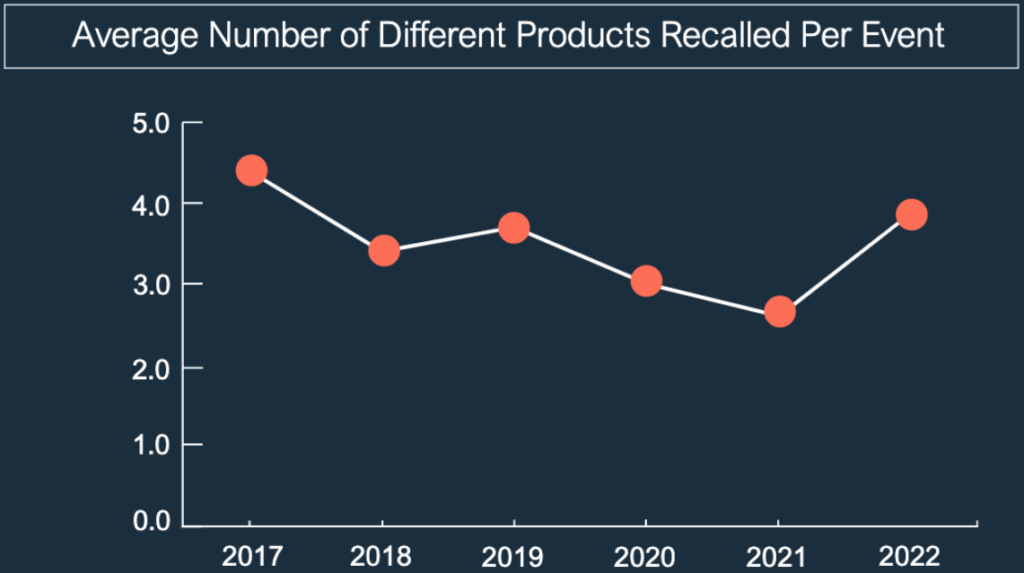
Note: The number of different products recalled per event can be distorted by a small number of recall events that involve a large number of different products. For example, one recall event in 2022 for leafy greens, potentially contaminated with Listeria monocytogenes, involved over 70 different products.
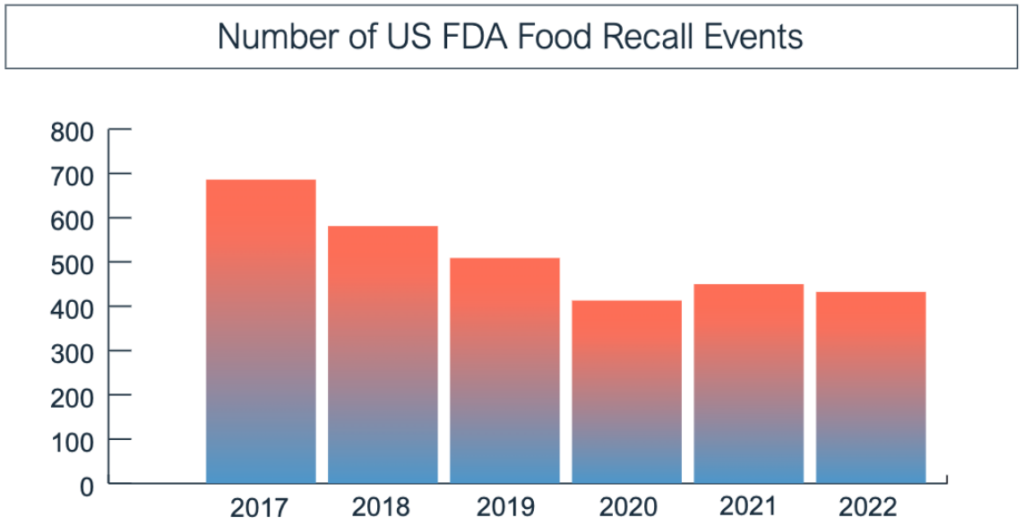
The number of FDA food recalls that could be classed as “Never Events” are increasing year on year. In 2022 over 25% of all food recalls issued by FDA were “Never Events”. These are recalls identified by RQA as those that should never happen. For example, where the wrong label has been used or the item has been put in the wrong 0 5 10 15 20 25 30 2020 2021 2022 packaging resulting in potential serious health risks due to allergens. We believe increased attention should be applied in food manufacturing facilities to prevent these recalls, and one way that’s made possible is through a food liability insurance program. Click here to see how RQA has applied the Never Event Principle from the health sector to food manufacturing.
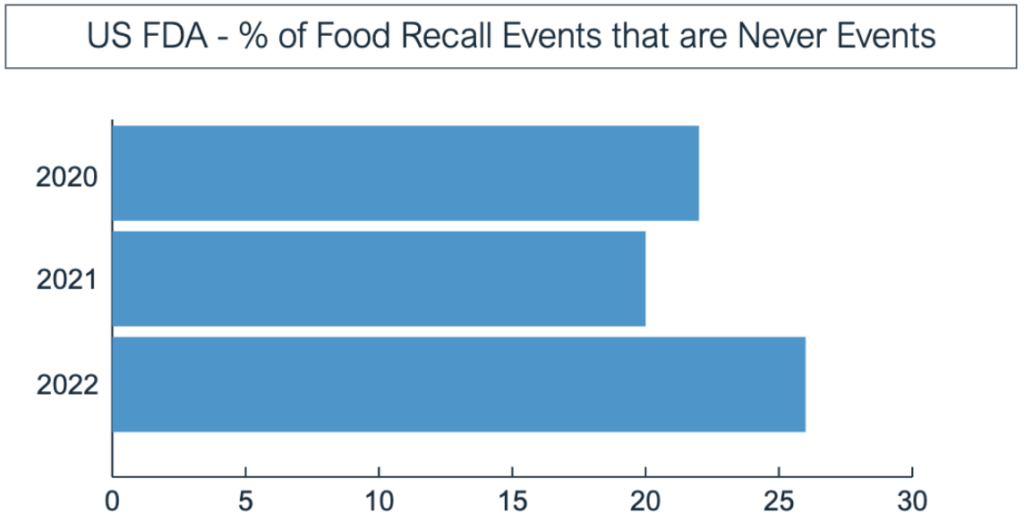
US FDA Recall Standings by Food Type
In the standings for 2022, confectionery products are still the most recalled food product type; owing in part to large scale recall events involving many different products containing Salmonella contaminated chocolate or contaminated peanut butter. It is interesting to see “Nutritional products” e.g. protein shakes and supplements, “Cereals and bakery” and “Nuts, seeds and snacks” rising up the standings.
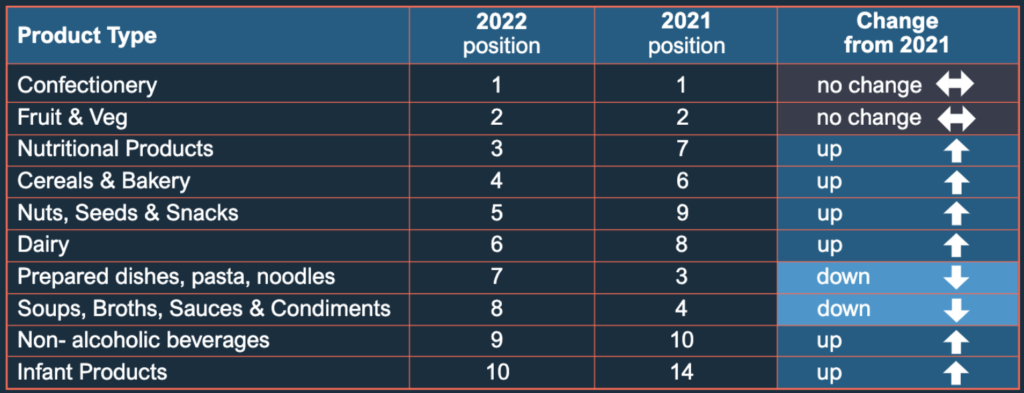
- Nuts seeds & snacks – Over half of the different products recalled were linked to a large Salmonella incident. As peanut butter is not only sold as a product but also as an ingredient or component in a snack style product this incident had a greater impact than may at first be expected. Secondly, with about a quarter of different products in this category being recalled due in some way to allergen issues, it would appear that there is a real need for this to be further controlled through raw material processes and labeling control practices.
- Infant products was largely driven by microbiological contamination with Cronobacter sakazakii early in 2022. In particular, a widespread event resulted in final numbers that were disproportionate to previous years’ data.
- Nutritional products – Around 25% were attributed to microbiological failures, spoilage or leaking/pinholed packaging which would also allow for spoilage. In a number of these cases there are apparent links to the peanut butter in the nuts & seeds category and/or the large spoilage issue (Cronobacter sakazakii) in infant formula. It should be noted that other category issues are highly indicative as potential issue generators in this category due to reliance on shared materials and processes. Interestingly Cronobacter sakazakii is only a specified microbe to test for in products intended for use in infants and high risk groups. As these are longer shelf life products however it was also reported that Clostridium botulinum was detected.
- Over half of the nutritional products recalled were allergen related, and around 70% of these were due to milk or egg.
US FDA Recall Standings by Contaminant Type
We have also listed the standings of the most common contaminants or causes of recalls reported by the FDA. The three contaminants affecting the most recalled products are the same in 2022, 2021 and 2020. Within microbiology, Listeria monocytogenes and Salmonella are always the most common pathogens. Milk is the most common allergen. Recalls due to allergen contamination may be due to cross contamination in the factory or supply chain, or it may be where the product has been put in the wrong pack and there is resulting allergen mislabelling. As mentioned above, we call the latter a “Never Event” product recall. Plastic is the most common foreign body contaminant in 2022, but this can vary from year to year. For example, metal was the most common foreign body contaminant in 2021. By now, it’s clear that the importance of a food liability insurance program cannot be underrated.

USDA FSIS Recalls
Key points:
- USDA recalls (Class I or II) still very low.
- There have been no Class III recalls since 2018.
- 2022 recall numbers have remained almost the same as 2021. This is still less than 40% of the numbers in 2019
- There is currently no sign that the recall numbers will be back at 2019 levels any time soon.
- Well over a million pounds of meat were recalled in 2022 with an average of around 26,000 pounds per recall.
- Why have FSIS recalls not recovered to pre pandemic levels? Could this be because FSIS inspectors are not rotating to different sites as frequently as pre-pandemic? Could it be due to funding or staffing issues?
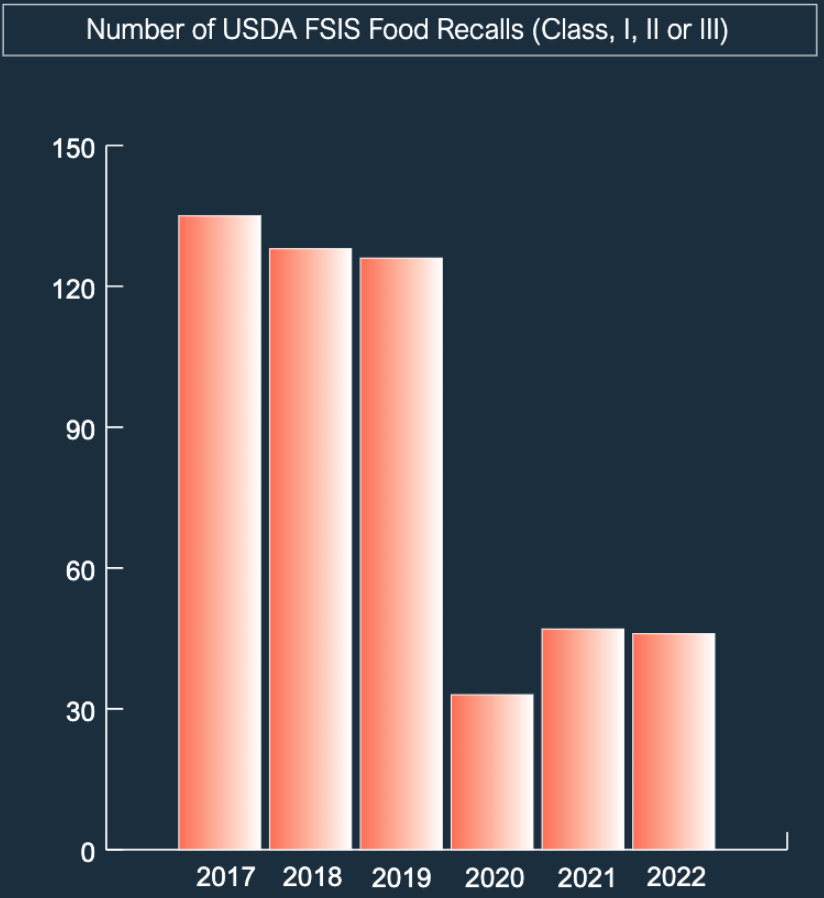
Need Product Recall insurance? We’ve got you covered!
Since 1947, Coughlin Insurance has worked hard to make a difference in our customers’ lives in ways that matter most to them. As food industry insurance specialists we provide our clients with access to key insurance products through our food liability insurance program. As long standing members of leading industry associations, including the Association of Food Industries (AFI), National Frozen & Refrigerated Foods Association (NFRA), and the Peanut And Tree Nut Processors Association (PTNPA), we will protect you in ways no one else will. Because we truly understand your unique needs. Coughlin Insurance Services. Relationship driven since 1947.
Source: RQA Group, Product Recall Bulletin 2022 Annual Report, https://www.rqa-group.com/wp-content/uploads/2023/01/RQA-Group-Product-Recall-Bulletin-2022_web.pdf. Accessed February 27, 2023.
